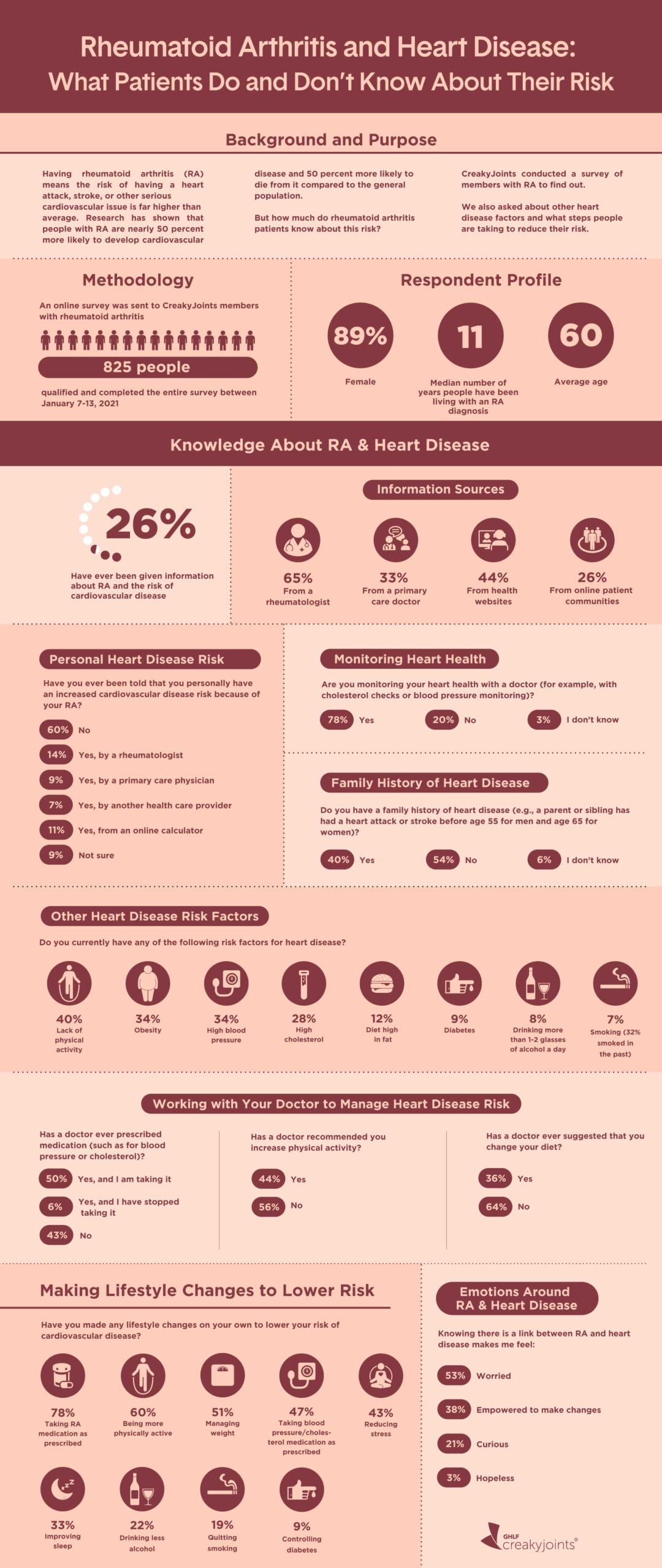Check out A Patient’s Guide to Understanding Rheumatoid Arthritis and Heart Disease for more information on this topic.
Having rheumatoid arthritis (RA) means the risk of having a heart attack, stroke, or other serious cardiovascular issue is far higher than average. Research has shown that people with RA are nearly 50 percent more likely to develop cardiovascular disease and 50 percent more likely to die from it from it compared to the general population.
But how much do rheumatoid arthritis patients know about this risk? CreakyJoints conducted an online survey of its members with RA to find out. We also asked about other heart disease factors and what steps people are taking to reduce their risk.
Conducted: January 7-13, 2021
Number of respondents who completed the survey: 825
Demographics of respondents: 89 percent were female, 91 percent were white, with an average age of 60 and a median length of time of 11 years since their RA diagnosis
What We Asked
We wanted to understand a few general areas:
- Are CreakyJoints members with rheumatoid arthritis aware of the connection between RA and an increased risk of heart disease, and if so, how did they learn about this connection?
- What are patients’ personal risk factors for heart disease aside from RA (self-reported)?
- What are patients doing (in terms of lifestyle changes and working with their doctor) to manage their heart disease risk factors?
- How do patients feel about knowing the connection between RA and increased heart disease risk?
We developed a 21-question survey to delve into these topics.
What We Learned
1. Most people did not get information about the link between RA and heart disease
About a quarter (25.7 percent) of participants reported having been given information about the link between RA and risk of cardiovascular disease (CVD).
Of those who had been given information, 137 (64.6 percent) received it from their rheumatologist, 94 (44.3 percent) from health websites, 70 (33 percent) from their primary care physician, and 55 (25.9 percent) from online patient communities (not mutually exclusive).
2. Most people were not told they have a higher risk of heart disease because of their rheumatoid arthritis
The majority (60.4 percent) of participants reported never having been told that they personally have a higher risk of CVD because of their RA. However, 86.2 percent had been told that they have a higher risk of CVD for reasons other than their RA, with about half (50.5 percent) having been told by their rheumatologist, 21.8 percent by another health care provider, and 10.5 percent through an online risk calculator.
3. Most people have *not* had a cardiovascular event, but *do* have many risk factors for heart disease
Of the 825 total respondents, 73 (8.8 percent) have had a cardiovascular event in the past, such as a heart attack or stroke, and 641 (77.7 percent) are monitoring their heart health with a doctor.
Forty percent have a family history of heart disease, and many participants currently have risk factors for heart disease, including high blood pressure (33.6 percent), obesity (33.7 percent), and high cholesterol (28.1 percent).
4. Many people are taking steps to lower their risk for heart disease
Half (415; 50.3 percent) of all participants are currently taking medication (such as cholesterol or blood pressure medication) prescribed to lower CVD risk, and many participants reported making lifestyle changes to lower their risk of CVD, such as taking their RA medication as prescribed (78.2 percent), being more physically active (59.8 percent), and managing their weight (50.5 percent).
5. People feel both concerned and empowered about knowing the link between RA and cardiovascular disease.
More than half (52.8 percent) of respondents said that knowing about the link between RA and your risk of cardiovascular disease makes them feel worried, while more than one-third (37.7 percent) said they feel empowered to make changes. Only a small number of respondents (3 percent) said knowing about RA and heart disease makes them feel hopeless. In a free response section, people were able to share more about this topic and some common themes emerged:
- Being more aware and vigilant to look for signs and symptoms of heart problems
- Making positive changes in diet, exercise, and other areas to help reduce the risk
- Feeling angry because RA keeps causing so many additional health issues
What This Tells Us
In a largely female and white population of CreakyJoints members diagnosed with rheumatoid arthritis, only a quarter of participants reported that they were given information about the link between RA and heart disease. In addition, most participants said that they have never been told about personally having a higher risk of cardiovascular disease due to their RA.
Still, the vast majority had been told that they have a higher risk of cardiovascular for other reasons and many are taking steps to help reduce the risk of cardiovascular disease.
There’s a lot you can do to learn more about why RA increases the risk of heart disease, how to monitor your heart health, and what to do to lower your risk. Check out these resources for more information:
- Rheumatoid Arthritis and Heart Disease: Why You’re at Increased Risk
- Preventing Heart Disease When You Have Rheumatoid Arthritis: Which Tests Do You Need?
- Rheumatoid Arthritis and Heart Disease: 28 Ways You Can Lower Your Risk
This article is part of A Patient’s Guide to Understanding Rheumatoid Arthritis and Heart Disease and was made possible with a grant from Myriad Genetics, Inc.






